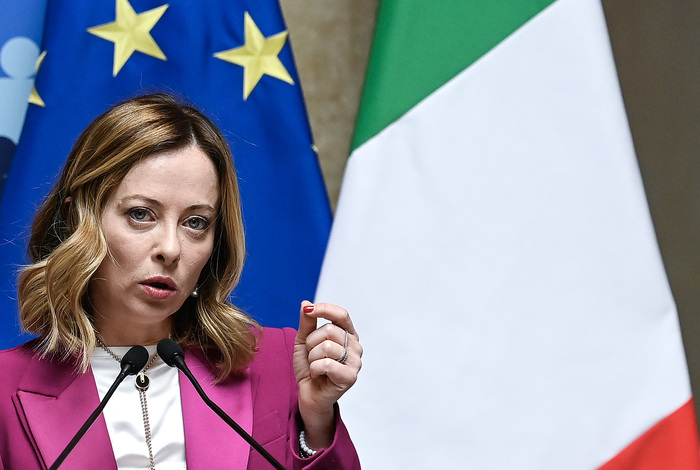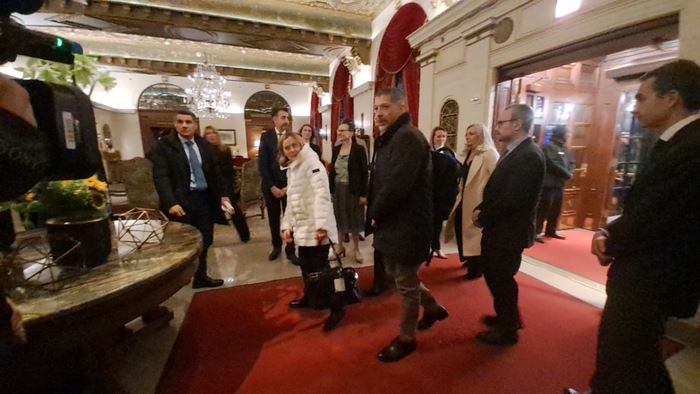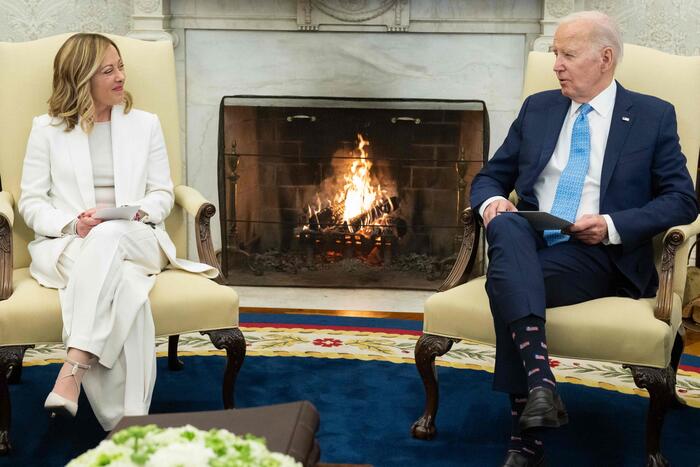Enlarge image
Chancellor Olaf Scholz, US President Biden: New, harsh reality
Photo:
LEONHARD FOEGER / picture alliance / ASSOCIATED PRESS
There was a time when the “world economic summits” (G7) were so unimportant that even Russia was allowed to take part.
From 1998 the G7 became the G8.
First Boris Yeltsin came from Moscow, then Vladimir Putin.
The annual meetings of the heads of state and government of the most important Western countries had already developed into ritualized show events.
When things went well, far-reaching initiatives for more international cooperation were launched there.
When things went badly, carefully staged images for home audiences remained the most important result.
But that didn't seem too bad.
Whether the world economic summits worked effectively or not didn't matter so much - globalization went on, one way or the other.
In any case, the United States did what they thought was right when it came to security policy, especially under George W. Bush.
And when there was an acute need for economic policy coordination, for example during the financial crisis of 2008, discussions were now held in the newly established G20 group.
These also included the large emerging countries, which now played an important international role.
Ceremonially all the more pompous
The heyday of the G7 was over, or so it seemed.
They were a relic of the 1970s and 1980s, when the world economy was still made up mostly of North America, Western Europe and Japan.
The fact that the USA, Japan, Germany, Great Britain, France, Italy and Canada as a group could still solve major, acute problems seemed rather absurd even in the noughties.
But it was ceremonially all the more pompous to the point.
The form outshone the content.
Russia's participation was not a big problem either: the symbolic inclusion of the Kremlin ruler in the circle of leading figures of western great and medium-sized powers was intended to flatter Russia without costing much.
Of course, it was clear to everyone that Russia was neither one of the largest economies, nor a market economy, nor an established democracy.
On a benevolent note, for a while it might have looked like it was on the way.
Viewed in this light, Russia's admission to the illustrious circle was a leap of faith in further liberalization.
When this turned out to be a mistake, Moscow was allowed to get away with a lot: brutal bombings in Chechnya, the occupation of areas in Georgia, the progressive co-ordination in their own country.
Putin's petrocracy might degenerate into a rogue state, but in the West, not only in Germany, people didn't want to admit that for a long time.
more on the subject
How the Germans made themselves dependent on Russia: we gas junkies
That only changed in 2014. The outrage over the annexation of Crimea was so great that Putin had to stay at home from then on – since then the G7 have been among themselves again.
Now the world economic summits are returning to their original role.
When they meet at Schloss Elmau in the Bavarian Alps from this
Sunday
, their old core task will be the focus again: global economic crisis management.
There really is enough to do: energy crisis, food crisis, inflation ( watch
out for new figures from Germany and the EU as a whole on
Wednesday
and
Friday ).
The greatest geostrategic opponent, ex-partner Putin, is still allowing his troops to advance in the Ukraine war, and despite all attempts to contain it, he is by no means isolated worldwide.
The West itself stands on shaky foundations.
All of this is reminiscent of the 1970s, when the origins of the world economic summits lie.
Globalization once, please – and back
In 1975, the heads of state and government of the six most important countries met in Rambouillet, France.
It was the first G6 meeting (Canada came later).
At that time, the consequences of the oil crisis, the resulting galloping inflation and fluctuating exchange rates were high on the agenda.
A technocratic surface, but existential dangers lurked in the background: the destabilization of western democracies.
Political terror shook Western Europe at the time;
strikes paralyzed whole countries;
in the USA, after the Vietnam debacle and the Watergate scandal, a president (Richard Nixon) had just been forced out of office by impeachment proceedings.
The West's internal fractures were all too clear - economic, political, social - while its ideological and military adversary, the Soviet Union, was rubbing its hands.
The world economic summits should give a common answer: we stand together and we act together.
A kind of collective leadership in an otherwise controlless world -
global governance to
prevent a slide into anarchy.
Parallels to the present are obvious.
Less power, unpredictable opponents
The world is splitting into blocks again.
But the position of the leading Western powers is much weaker today - while they face even greater challenges than they did then.
In the 1970s, the G7 countries together generated half of global economic output and accounted for the bulk of international trade among themselves.
Their opponents, above all the Soviet Union and China, were poor and backward.
They had long since abandoned the plan for a communist world revolution.
They were satisfied with securing what they had achieved - no more expansive powers, but structurally conservative.
Today, the G7 still contribute just a quarter to the economy and trade.
Even if you add the EU as a whole, which attends the summits as a permanent observer, the role of the West is decimated.
Other states have risen to become powerful players.
As a result, the G7's ability to assert itself and control has declined.
Sure, the West still dominates when it comes to high-tech;
and has the only significant international currencies (dollar, euro) and large, open financial markets.
That is precisely why the Western sanctions focus primarily on these areas.
But here, too, others are catching up, especially China.
Unlike in the 1970s, the West is now confronted with expansionist opponents who are expanding their spheres of influence without great scruples and – apart from a few crude nationalist impulses – without any ideological foundation.
The scope of Russia's attack on Ukraine goes far beyond the proxy wars of the Cold War era.
China's expansion in the South Pacific and the threat to seize Taiwan pose a risk not only to the stability of the world order, but also to the global supply of computer chips, of which the democratic island nation of China is the main producer.
Other powers like India, South Africa and Saudi Arabia are maneuvering between the new geopolitical demarcation lines and trying to get short-term advantages for themselves: energy deals here, arms deliveries there.
The West and its Main Adversary
Unlike in the G8 days, Russia no longer even pretends to be part of the solution.
Russia is clearly the problem now, and the leadership in Moscow seems to be taking some pride in the disruption it is creating around the world.
more on the subject
Western Alliances:Bye-bye, BidenA column by Henrik Müller
The invasion of Ukraine, the deaths and murders, the agonizing war of fatigue that could still bring Putin the conquest of large parts of the neighboring country;
the blockade of the Black Sea ports, which thwarts much-needed grain exports, the lack of which plunges poorer countries into hunger crises and can destabilize entire regions of the world;
turning on the gas tap that could plunge Europe, especially Germany, into a deep crisis that lasts for years – the West may have a few other problems, but its main problem is Russia.
And that will probably remain so for the foreseeable future.
Accordingly, the G7 are trying to contain the economic upheavals caused by Moscow, while NATO is striving to counter Russia's aggression more militarily.
Tuesday
.)
Unlike previous G7 summits, Elmau primarily deals with acute, existential questions: How can we get inflation under control?
What can we do together to counter the energy shortage?
How can hunger in poorer countries and their destabilization be alleviated?
When everything goes haywire
One geopolitical crisis lays the seeds for the next – if it is not resolved but only delayed.
advertisement
Henrik Mueller
Short-cut politics: How permanent outrage destroys our democracy
Publisher: Piper
Number of pages: 256
Publisher: Piper
Number of pages: 256
Buy for €22.00
price inquiry time
06/26/2022 2:52 p.m
No guarantee
Order from Amazon
Order from Thalia
Order from Weltbild
Product reviews are purely editorial and independent.
Via the so-called affiliate links above, we usually receive a commission from the retailer when you make a purchase.
More information here
There's a lot at stake on the summit in the Alps.
If the West is to get off the defensive, the G7 must come up with a plan that lays out clearly how they intend to deal with the Putin shock at all levels.
The West must demonstrate that it acts in an orderly and value-based manner, not only with its own immediate interests in mind, but also the well-being of the rest of the world.
Finally, Western liberalism raises a universal claim that it must live up to, at least to some extent, if it is to maintain its credibility.
It's easier for dictators: They get away with unscrupulous actions and transparent lies because no one expects more from them anyway.
If the West
should not
succeed in finally pushing back Russia's expansionism and mitigating its consequences, then international relations and Europe are in danger of slipping so much that we do not want to see it happen: borders would no longer be secure because a bad precedent would be set;
the EU might be fatally weakened because the Eastern Europeans could lose all trust in their Western European partners.
The G7 summit should therefore set the course for a new, harsh reality: a conflict that has lasted for many years.
This means that the previous ad hoc measures that have been used to support Ukraine must give way to an orderly flow of military material, financial and humanitarian aid.
The G7 should treat the management of Europe's energy shortage after cutting off the west-east gas connections as a joint task.
At the same time, they must help Africa and parts of Asia to fight hunger and stem conflicts.
To name only the most important points.
The Elmau meeting could prove to be the most important summit in G7 history.
As a historic fork in the road – for better or much worse.
The most important economic dates of the coming week
Expand areaMonday
Garmisch-Patenkirchen -
Joe, Olaf and all the others
- continuation of the G7 summit at Schloss Elmau (until Tuesday).
Joined: the Ukrainian President Selenskyj.
Also present: the heads of government from India, Indonesia, South Africa, Argentina and Senegal.
ExpandareaTuesday
Madrid -
deterrence and attention
- beginning of the NATO summit in the Spanish capital, last station of the top meetings (first EU, then G7).
It's about the accession of Sweden and Finland, help for Ukraine and a credible deterrent on the border with Russia, from Estonia to Romania.
ExpandareaWednesday
Wiesbaden –
Expensive, expensive…
–
That
The Federal Statistical Office announces a first estimate for the inflation rate in June 2022.
Expand areaThursday
Luxembourg/Nuremberg -
Vacancies
- Eurostat and the Federal Employment Agency present data on the situation on the labor market in the EU and in Germany.
Beijing -
The
economy in the Far East
- New figures on the mood among China's purchasing managers.
ExpandareaFriday
Luxembourg -
Date for Lagarde
- New euro area inflation figures from Eurostat.
The European Central Bank (ECB) is increasingly under pressure to act.
Frankfurt -
German economy
- The mechanical engineering association VDMA publishes new figures for incoming orders in Germany's flagship industry









